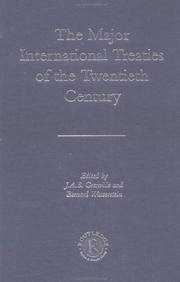| Listing 1 - 10 of 3780 | << page >> |
Sort by
|
Periodical
ISSN: 00828319 Publisher: New York (N.Y.) : United Nations,
Abstract | Keywords | Export | Availability | Bookmark
 Loading...
Loading...Choose an application
- Reference Manager
- EndNote
- RefWorks (Direct export to RefWorks)
Book
ISBN: 9781107561441 9781107124233 9781316415832 1107561442 Year: 2016 Publisher: Cambridge: Cambridge university press,
Abstract | Keywords | Export | Availability | Bookmark
 Loading...
Loading...Choose an application
- Reference Manager
- EndNote
- RefWorks (Direct export to RefWorks)
Every year, states negotiate, conclude, sign, and give effect to hundreds of new international agreements. Koremenos argues that the detailed design provisions of such agreements matter for phenomena that scholars, policymakers, and the public care about: when and how international cooperation occurs and is maintained. Theoretically, Koremenos develops hypotheses regarding how cooperation problems like incentives to cheat can be confronted and moderated through law's detailed design provisions. Empirically, she exploits her data set composed of a random sample of international agreements in economics, the environment, human rights and security. Her theory and testing lead to a consequential discovery: considering the vagaries of international politics, international cooperation looks more law-like than anarchical, with the detailed provisions of international law chosen in ways that increase the prospects and robustness of cooperation. This nuanced and sophisticated 'continent of international law' can speak to scholars in any discipline where institutions, and thus institutional design, matter.Read more at http://www.cambridge.org/gb/academic/subjects/politics-international-relations/international-relations-and-international-organisations/continent-international-law-explaining-agreement-design#1O9C4DeUKjiMDDrU.99 "Every year, states negotiate, conclude, sign, and give effect to hundreds of new international agreements. In 2013, 500 separate agreements officially entered into force; an additional 248 agreements were modified. All told, a substantial body of international law was enacted or changed to adapt to the evolving needs of international cooperation. Adding these new pieces of international law to the body of already existing agreements, the total number of international agreements and agreement updates now in force approaches 200,000"--

ISBN: 0415237998 Year: 2001 Publisher: London : Routledge,
Abstract | Keywords | Export | Availability | Bookmark
 Loading...
Loading...Choose an application
- Reference Manager
- EndNote
- RefWorks (Direct export to RefWorks)

Abstract | Keywords | Export | Availability | Bookmark
 Loading...
Loading...Choose an application
- Reference Manager
- EndNote
- RefWorks (Direct export to RefWorks)
Book
ISBN: 1854880284 Year: 1990 Publisher: London : Tri-Service,
Abstract | Keywords | Export | Availability | Bookmark
 Loading...
Loading...Choose an application
- Reference Manager
- EndNote
- RefWorks (Direct export to RefWorks)

ISBN: 041523798X Year: 2001 Publisher: London : Routledge,
Abstract | Keywords | Export | Availability | Bookmark
 Loading...
Loading...Choose an application
- Reference Manager
- EndNote
- RefWorks (Direct export to RefWorks)
Abstract | Keywords | Export | Availability | Bookmark
 Loading...
Loading...Choose an application
- Reference Manager
- EndNote
- RefWorks (Direct export to RefWorks)
Book
ISBN: 1280931671 9786610931675 Year: 2006 Publisher: [Place of publication not identified] Council of Europe
Abstract | Keywords | Export | Availability | Bookmark
 Loading...
Loading...Choose an application
- Reference Manager
- EndNote
- RefWorks (Direct export to RefWorks)
This volume compiles the papers and comments delivered and the conclusions reached at the seminar "The Status of International Treaties on Human Rights", which was organised in Coimbra, Portugal, on 7 and 8 October 2005 by the Venice Commission in co-operation with the lus Gentium Coimbrigae Centre and the Faculty of Law of the University of Coimbra and the International Association of Constitutional Law (IACL).The reports analyses the specific features of international human rights treaties; the impact of state succession on these treaties; the territorial scope of human rights obligations; the position of human rights treaties in the national legal systems; the impact on the national systems of the obligation to comply with the judgments of the European Court of Human Rights; the criteria for establishing the hierarchy of legal rules in national and international law; the difference between jus cogens and core rights; and the protection of core rights through international jurisdiction or universal domestic jurisdiction.
Book
ISBN: 8476983832 9788476983836 Year: 1996 Publisher: Barcelona: Bosch,
Abstract | Keywords | Export | Availability | Bookmark
 Loading...
Loading...Choose an application
- Reference Manager
- EndNote
- RefWorks (Direct export to RefWorks)
Book
Year: 1961 Publisher: Oxford: Clarendon,
Abstract | Keywords | Export | Availability | Bookmark
 Loading...
Loading...Choose an application
- Reference Manager
- EndNote
- RefWorks (Direct export to RefWorks)
| Listing 1 - 10 of 3780 | << page >> |
Sort by
|

 Search
Search Feedback
Feedback About UniCat
About UniCat  Help
Help News
News